Boardman J., Hammond N.G. L. The Cambridge Ancient History Volume 3, Part 3: The Expansion of the Greek World, Eighth to Sixth Centuries BC
Подождите немного. Документ загружается.

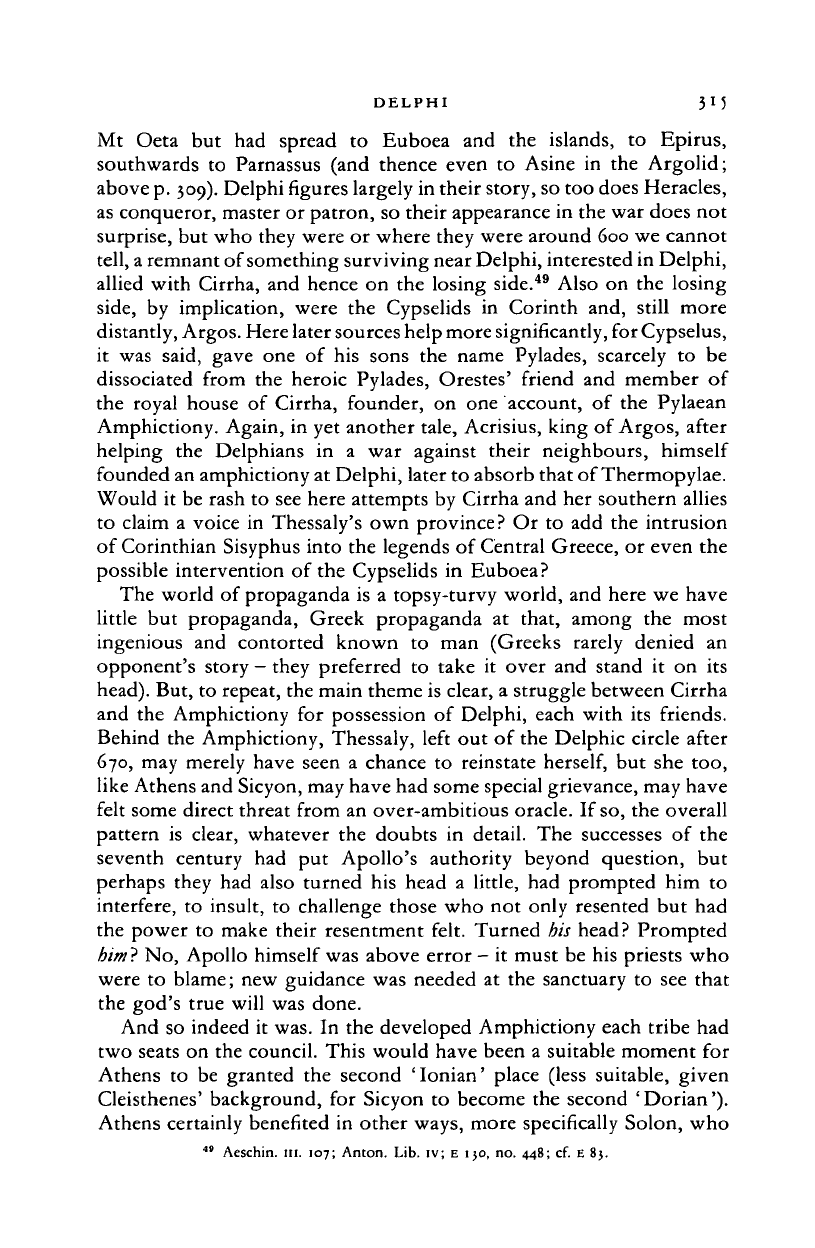
DELPHI
315
Mt Oeta but had spread to Euboea and the islands, to Epirus,
southwards to Parnassus (and thence even to Asine in the Argolid;
above
p.
309). Delphi figures largely in their story, so too does Heracles,
as conqueror, master or patron, so their appearance in the war does not
surprise, but who they were or where they were around 600 we cannot
tell,
a remnant of something surviving near Delphi, interested in Delphi,
allied with Cirrha, and hence on the losing side.
49
Also on the losing
side,
by implication, were the Cypselids in Corinth and, still more
distantly,
Argos.
Here later sources help more significantly, for Cypselus,
it was said, gave one of his sons the name Pylades, scarcely to be
dissociated from the heroic Pylades, Orestes' friend and member of
the royal house of Cirrha, founder, on one account, of the Pylaean
Amphictiony. Again, in yet another tale, Acrisius, king of Argos, after
helping the Delphians in a war against their neighbours, himself
founded an amphictiony at Delphi, later to absorb that of Thermopylae.
Would it be rash to see here attempts by Cirrha and her southern allies
to claim a voice in Thessaly's own province? Or to add the intrusion
of Corinthian Sisyphus into the legends of Central Greece, or even the
possible intervention of the Cypselids in Euboea?
The world of propaganda is a topsy-turvy world, and here we have
little but propaganda, Greek propaganda at that, among the most
ingenious and contorted known to man (Greeks rarely denied an
opponent's story
—
they preferred to take it over and stand it on its
head).
But, to repeat, the main theme is clear, a struggle between Cirrha
and the Amphictiony for possession of Delphi, each with its friends.
Behind the Amphictiony, Thessaly, left out of the Delphic circle after
670,
may merely have seen a chance to reinstate
herself,
but she too,
like Athens and Sicyon, may have had some special grievance, may have
felt some direct threat from an over-ambitious oracle. If
so,
the overall
pattern is clear, whatever the doubts in detail. The successes of the
seventh century had put Apollo's authority beyond question, but
perhaps they had also turned his head a little, had prompted him to
interfere, to insult, to challenge those who not only resented but had
the power to make their resentment felt. Turned his head? Prompted
him} No, Apollo himself was above error - it must be his priests who
were to blame; new guidance was needed at the sanctuary to see that
the god's true will was done.
And so indeed it was. In the developed Amphictiony each tribe had
two seats on the council. This would have been a suitable moment for
Athens to be granted the second 'Ionian' place (less suitable, given
Cleisthenes' background, for Sicyon to become the second 'Dorian').
Athens certainly benefited in other ways, more specifically Solon, who
49
Aeschin. m. 107; Anton. Lib. iv; E
IJO,
no. 448; cf. E 83.
Cambridge Histories Online © Cambridge University Press, 2008
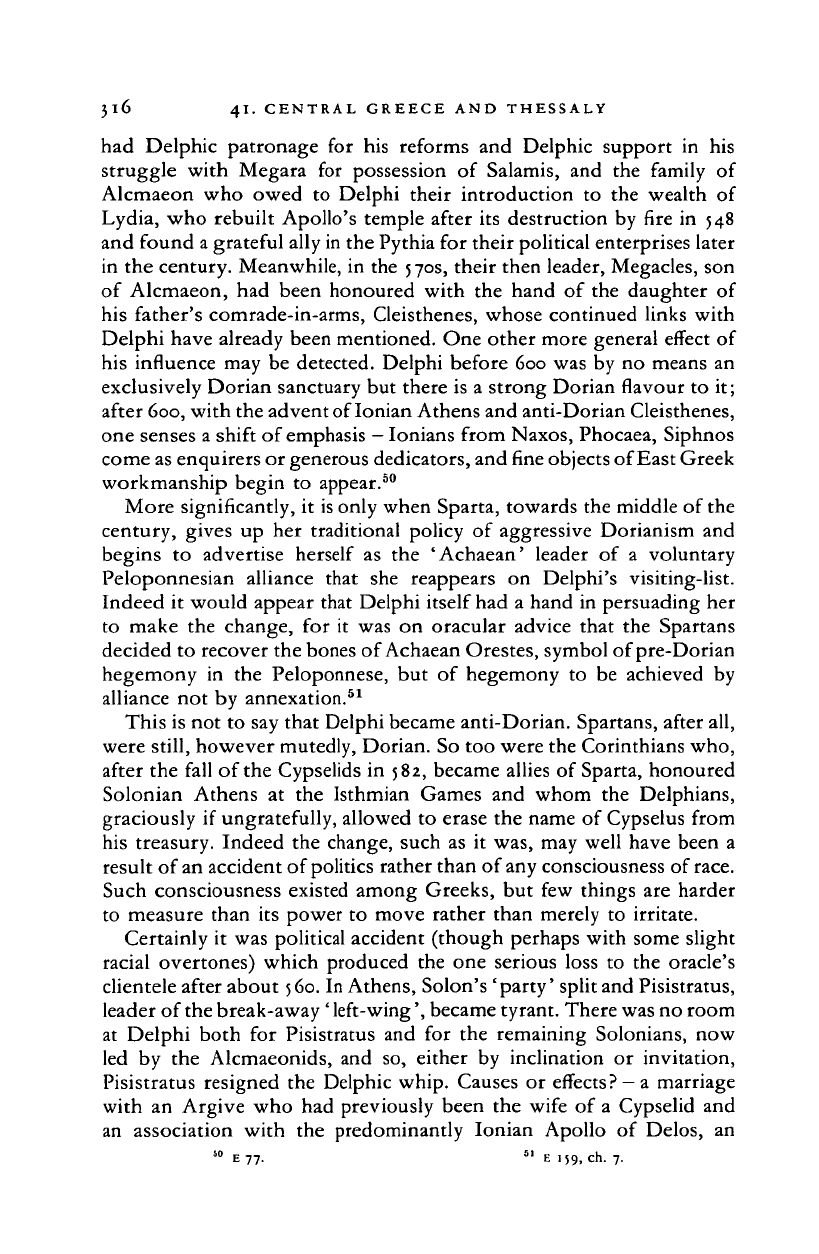
316
41.
CENTRAL GREECE AND THESSALV
had Delphic patronage
for his
reforms
and
Delphic support
in his
struggle with Megara
for
possession
of
Salamis,
and the
family
of
Alcmaeon
who
owed
to
Delphi their introduction
to the
wealth
of
Lydia,
who
rebuilt Apollo's temple after
its
destruction
by
fire
in 548
and found
a
grateful ally in the Pythia
for
their political enterprises later
in
the
century. Meanwhile,
in the
5
70s,
their then leader, Megacles,
son
of Alcmaeon,
had
been honoured with
the
hand
of the
daughter
of
his father's comrade-in-arms, Cleisthenes, whose continued links with
Delphi have already been mentioned.
One
other more general effect
of
his influence
may be
detected. Delphi before
600 was by no
means
an
exclusively Dorian sanctuary
but
there
is a
strong Dorian flavour
to it;
after 600, with the advent of Ionian Athens and anti-Dorian Cleisthenes,
one senses
a
shift
of
emphasis
-
Ionians from Naxos, Phocaea, Siphnos
come as enquirers
or
generous dedicators, and fine objects of East Greek
workmanship begin
to
appear.
50
More significantly,
it
is only when Sparta, towards
the
middle
of
the
century, gives
up her
traditional policy
of
aggressive Dorianism
and
begins
to
advertise herself
as the
'Achaean' leader
of a
voluntary
Peloponnesian alliance that
she
reappears
on
Delphi's visiting-list.
Indeed
it
would appear that Delphi itself had
a
hand
in
persuading
her
to make
the
change,
for it was on
oracular advice that
the
Spartans
decided
to
recover the bones of Achaean Orestes, symbol of pre-Dorian
hegemony
in the
Peloponnese,
but of
hegemony
to be
achieved
by
alliance
not by
annexation.
51
This
is not to
say that Delphi became anti-Dorian. Spartans, after all,
were still, however mutedly, Dorian. So too were the Corinthians who,
after
the
fall
of
the Cypselids
in
582, became allies
of
Sparta, honoured
Solonian Athens
at the
Isthmian Games
and
whom
the
Delphians,
graciously
if
ungratefully, allowed
to
erase
the
name
of
Cypselus from
his treasury. Indeed
the
change, such
as it
was,
may
well have been
a
result
of
an accident of politics rather than
of
any consciousness
of
race.
Such consciousness existed among Greeks,
but few
things
are
harder
to measure than
its
power
to
move rather than merely
to
irritate.
Certainly
it was
political accident (though perhaps with some slight
racial overtones) which produced
the one
serious loss
to the
oracle's
clientele after about 560. In Athens, Solon's 'party' split and Pisistratus,
leader
of
the break-away ' left-wing', became tyrant. There was no room
at Delphi both
for
Pisistratus
and for the
remaining Solonians,
now
led
by the
Alcmaeonids,
and so,
either
by
inclination
or
invitation,
Pisistratus resigned
the
Delphic whip. Causes
or
effects?-a marriage
with
an
Argive
who had
previously been
the
wife
of a
Cypselid
and
an association with
the
predominantly Ionian Apollo
of
Delos,
an
50
E
77
.
61
E
159,
ch. 7.
Cambridge Histories Online © Cambridge University Press, 2008
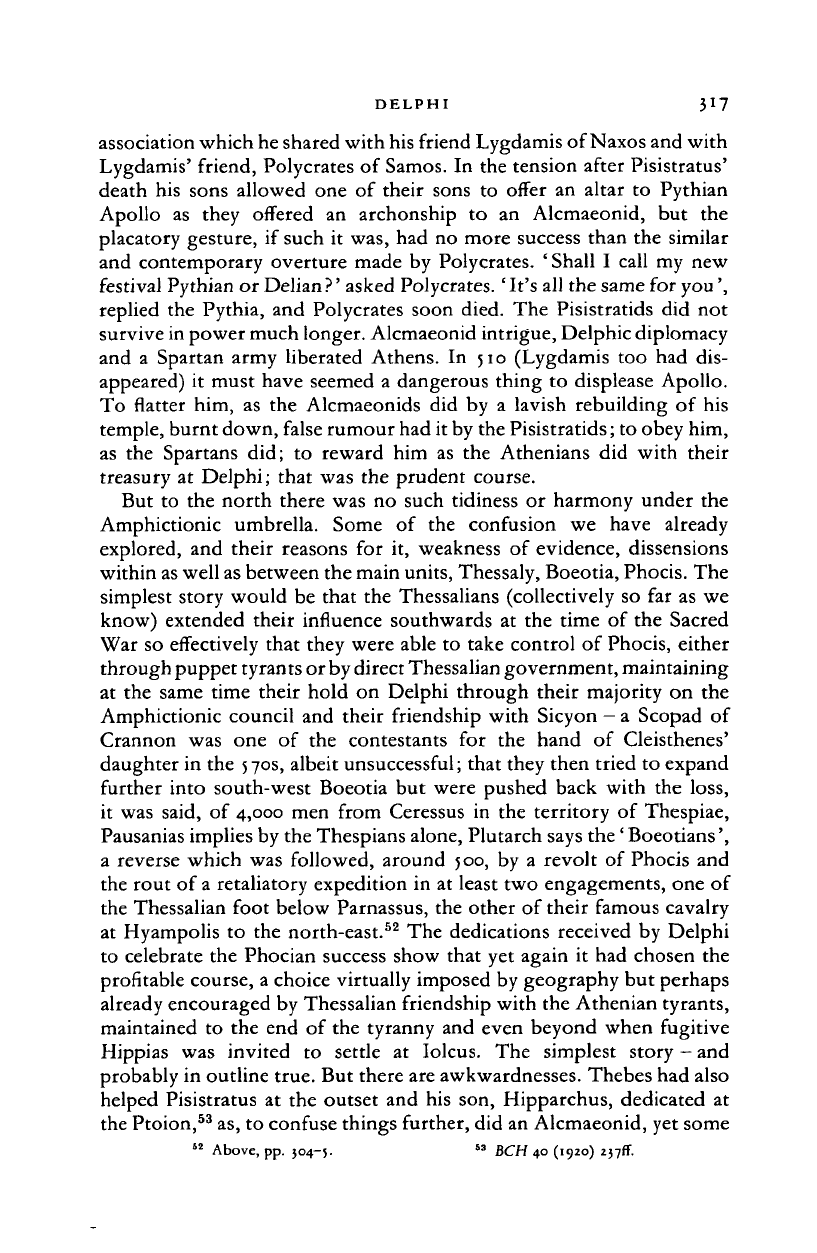
DELPHI
317
association which he shared with his friend Lygdamis of Naxos and with
Lygdamis' friend, Polycrates
of
Samos.
In
the tension after Pisistratus'
death
his
sons allowed
one of
their sons
to
offer
an
altar
to
Pythian
Apollo
as
they offered
an
archonship
to an
Alcmaeonid,
but the
placatory gesture,
if
such
it
was,
had no
more success than
the
similar
and contemporary overture made
by
Polycrates. 'Shall
I
call
my new
festival Pythian or Delian?' asked Polycrates.' It's all the same
for
you',
replied
the
Pythia,
and
Polycrates soon died.
The
Pisistratids
did not
survive in power much longer. Alcmaeonid intrigue, Delphic diplomacy
and
a
Spartan army liberated Athens.
In 510
(Lygdamis
too had dis-
appeared)
it
must have seemed
a
dangerous thing
to
displease Apollo.
To flatter
him, as the
Alcmaeonids
did by a
lavish rebuilding
of his
temple, burnt down, false rumour had
it
by the Pisistratids; to obey him,
as
the
Spartans
did; to
reward
him as the
Athenians
did
with their
treasury
at
Delphi; that was
the
prudent course.
But
to the
north there was
no
such tidiness
or
harmony under
the
Amphictionic umbrella. Some
of the
confusion
we
have already
explored,
and
their reasons
for it,
weakness
of
evidence, dissensions
within as well as between the main units, Thessaly, Boeotia, Phocis.
The
simplest story would
be
that
the
Thessalians (collectively
so far as we
know) extended their influence southwards
at the
time
of the
Sacred
War
so
effectively that they were able
to
take control
of
Phocis, either
through puppet tyrants or by direct Thessalian government, maintaining
at
the
same time their hold
on
Delphi through their majority
on the
Amphictionic council
and
their friendship with Sicyon
—
a Scopad
of
Crannon
was one of the
contestants
for the
hand
of
Cleisthenes'
daughter
in
the 570s, albeit unsuccessful; that they then tried to expand
further into south-west Boeotia
but
were pushed back with
the
loss,
it was said,
of
4,000
men
from Ceressus
in the
territory
of
Thespiae,
Pausanias implies by the Thespians alone, Plutarch says the' Boeotians',
a reverse which was followed, around 500,
by a
revolt
of
Phocis
and
the rout
of
a
retaliatory expedition
in at
least two engagements, one
of
the Thessalian foot below Parnassus,
the
other
of
their famous cavalry
at Hyampolis
to the
north-east.
52
The
dedications received
by
Delphi
to celebrate
the
Phocian success show that
yet
again
it had
chosen
the
profitable course, a choice virtually imposed by geography but perhaps
already encouraged by Thessalian friendship with the Athenian tyrants,
maintained
to the end of
the tyranny
and
even beyond when fugitive
Hippias
was
invited
to
settle
at
Iolcus.
The
simplest story
-
and
probably
in
outline true. But there are awkwardnesses. Thebes had also
helped Pisistratus
at the
outset
and his son,
Hipparchus, dedicated
at
the Ptoion,
53
as, to confuse things further, did an Alcmaeonid, yet some
" Above, pp. 304-5.
M
BCH
40
(1920)
2
37
ff.
Cambridge Histories Online © Cambridge University Press, 2008
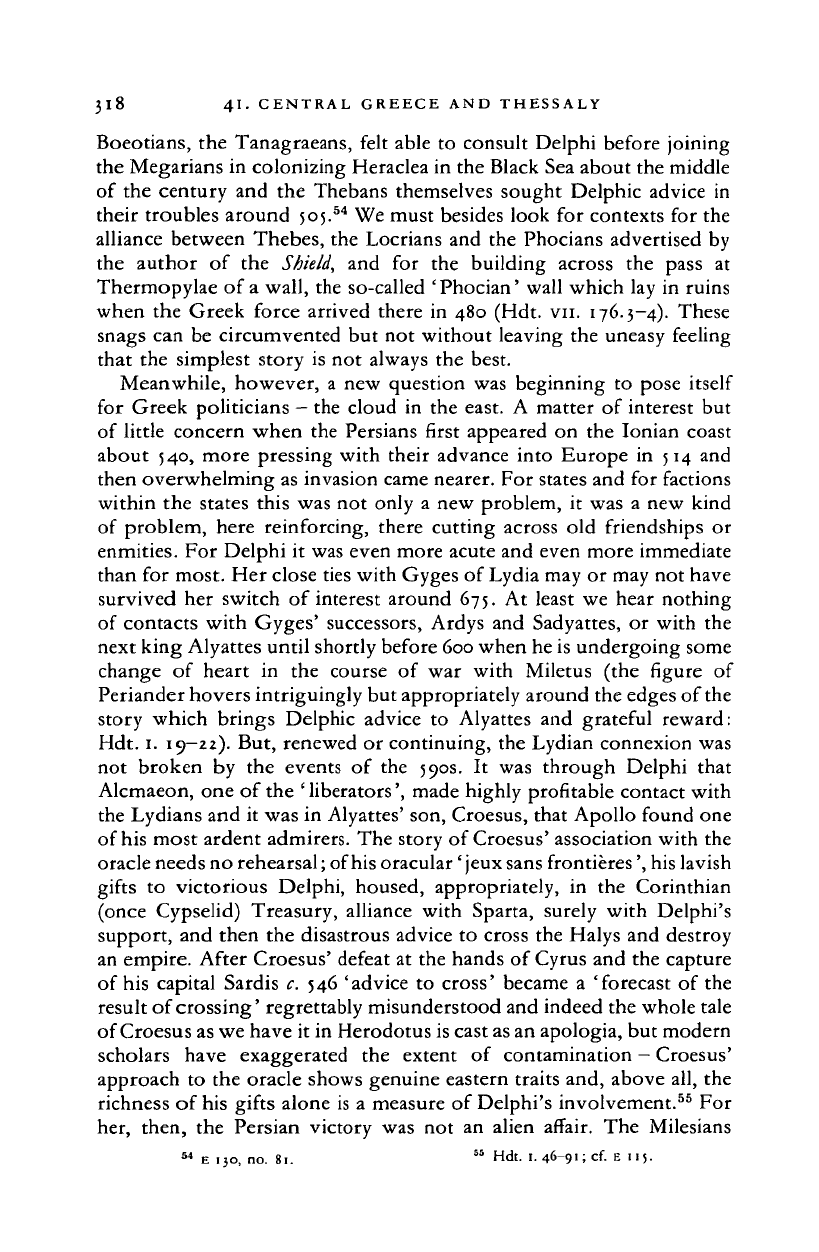
3 I 8
41.
CENTRAL GREECE AND THESSALY
Boeotians, the Tanagraeans, felt able
to
consult Delphi before joining
the Megarians in colonizing Heraclea in the Black Sea about the middle
of the century and the Thebans themselves sought Delphic advice
in
their troubles around
505.
54
We must besides look for contexts for the
alliance between Thebes, the Locrians and the Phocians advertised by
the author
of the
Shield,
and for the
building across
the
pass
at
Thermopylae of a wall, the so-called 'Phocian' wall which lay in ruins
when the Greek force arrived there
in
480 (Hdt. vn. 176.3-4). These
snags can be circumvented but not without leaving the uneasy feeling
that the simplest story is not always the best.
Meanwhile, however,
a
new question was beginning
to
pose itself
for Greek politicians
—
the cloud
in
the east.
A
matter
of
interest but
of little concern when the Persians first appeared
on
the Ionian coast
about 540, more pressing with their advance into Europe
in
514 and
then overwhelming as invasion came nearer. For states and for factions
within the states this was not only
a
new problem,
it
was
a
new kind
of problem, here reinforcing, there cutting across
old
friendships
or
enmities. For Delphi
it
was even more acute and even more immediate
than for most. Her close ties with Gyges of Lydia may or may not have
survived her switch
of
interest around 675.
At
least we hear nothing
of contacts with Gyges' successors, Ardys and Sadyattes,
or
with
the
next king Alyattes until shortly before 600 when he is undergoing some
change
of
heart
in the
course
of
war with Miletus
(the
figure
of
Periander hovers intriguingly but appropriately around the edges of the
story which brings Delphic advice
to
Alyattes and grateful reward:
Hdt. 1. 19-22). But, renewed or continuing, the Lydian connexion was
not broken
by the
events
of
the 590s.
It
was through Delphi that
Alcmaeon, one of the ' liberators', made highly profitable contact with
the Lydians and it was in Alyattes' son, Croesus, that Apollo found one
of his most ardent admirers. The story of Croesus' association with the
oracle needs no rehearsal; of his oracular' jeux sans frontieres', his lavish
gifts
to
victorious Delphi, housed, appropriately,
in the
Corinthian
(once Cypselid) Treasury, alliance with Sparta, surely with Delphi's
support, and then the disastrous advice to cross the Halys and destroy
an empire. After Croesus' defeat at the hands of Cyrus and the capture
of his capital Sardis c. 546 'advice
to
cross' became
a
'forecast
of
the
result of crossing' regrettably misunderstood and indeed the whole tale
of Croesus as we have it in Herodotus is cast as an apologia, but modern
scholars have exaggerated
the
extent
of
contamination
—
Croesus'
approach to the oracle shows genuine eastern traits and, above all, the
richness
of
his gifts alone is
a
measure
of
Delphi's involvement.
55
For
her, then,
the
Persian victory was
not an
alien affair. The Milesians
54
E 150, no. 81. "
Hdt
- 1.
46-9'icf-
E
"5-
Cambridge Histories Online © Cambridge University Press, 2008
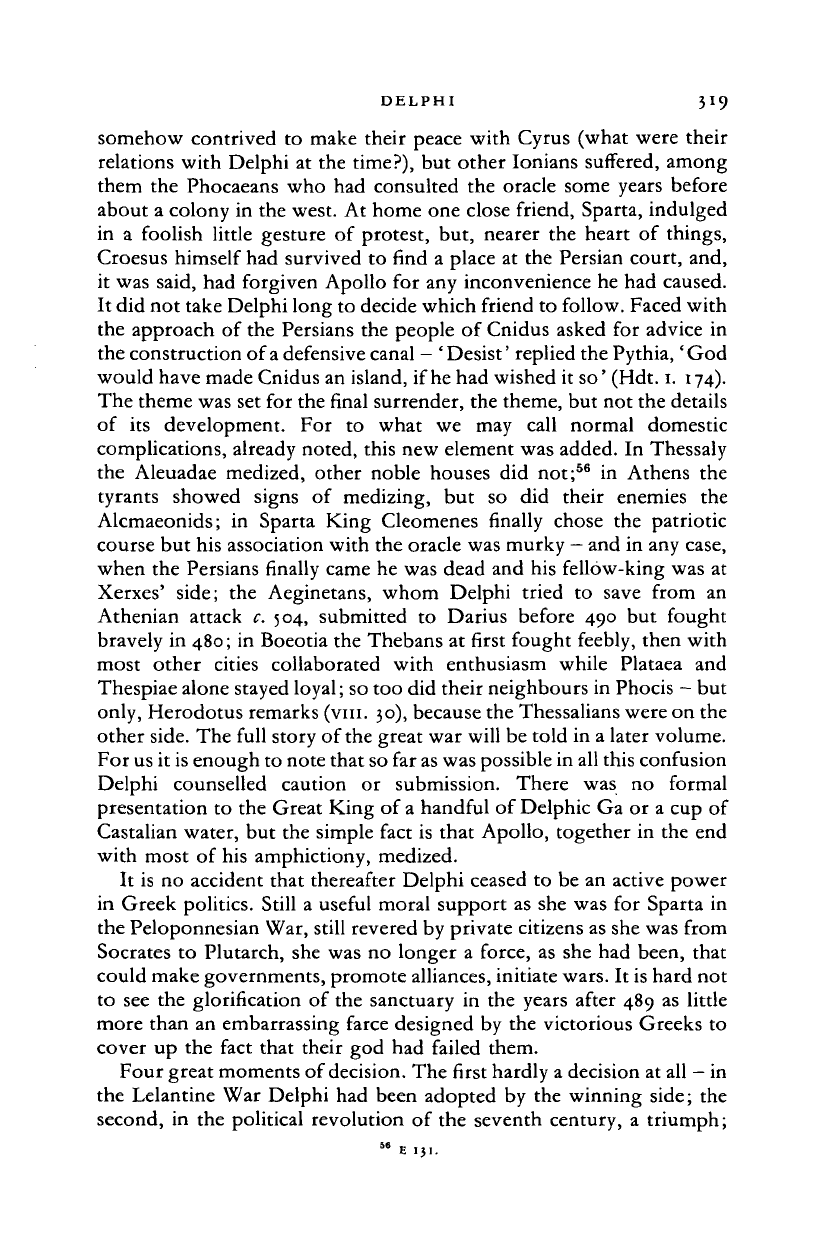
DELPHI
319
somehow contrived to make their peace with Cyrus (what were their
relations with Delphi at the time?), but other Ionians suffered, among
them the Phocaeans who had consulted the oracle some years before
about a colony in the west. At home one close friend, Sparta, indulged
in a foolish little gesture of protest, but, nearer the heart of things,
Croesus himself had survived to find a place at the Persian court, and,
it was said, had forgiven Apollo for any inconvenience he had caused.
It did not take Delphi long to decide which friend to follow. Faced with
the approach of the Persians the people of Cnidus asked for advice in
the construction of a defensive canal - 'Desist' replied the Pythia, 'God
would have made Cnidus an island, if he had wished it so' (Hdt.
1.
174).
The theme was set for the final surrender, the theme, but not the details
of its development. For to what we may call normal domestic
complications, already noted, this new element was added. In Thessaly
the Aleuadae medized, other noble houses did not;
56
in Athens the
tyrants showed signs of medizing, but so did their enemies the
Alcmaeonids; in Sparta King Cleomenes finally chose the patriotic
course but his association with the oracle was murky
—
and in any case,
when the Persians finally came he was dead and his fellow-king was at
Xerxes' side; the Aeginetans, whom Delphi tried to save from an
Athenian attack c. 504, submitted to Darius before 490 but fought
bravely in 480; in Boeotia the Thebans at first fought feebly, then with
most other cities collaborated with enthusiasm while Plataea and
Thespiae alone stayed loyal; so too did their neighbours in Phocis
—
but
only, Herodotus remarks (vin. 30), because the Thessalians were on the
other side. The full story of the great war will be told in a later volume.
For us it is enough to note that so far as was possible in all this confusion
Delphi counselled caution or submission. There was no formal
presentation to the Great King of a handful of Delphic Ga or a cup of
Castalian water, but the simple fact is that Apollo, together in the end
with most of his amphictiony, medized.
It is no accident that thereafter Delphi ceased to be an active power
in Greek politics. Still a useful moral support as she was for Sparta in
the Peloponnesian War, still revered by private citizens as she was from
Socrates to Plutarch, she was no longer a force, as she had been, that
could make governments, promote alliances, initiate wars. It is hard not
to see the glorification of the sanctuary in the years after 489 as little
more than an embarrassing farce designed by the victorious Greeks to
cover up the fact that their god had failed them.
Four great moments of
decision.
The first hardly a decision at all - in
the Lelantine War Delphi had been adopted by the winning side; the
second, in the political revolution of the seventh century, a triumph;
Cambridge Histories Online © Cambridge University Press, 2008
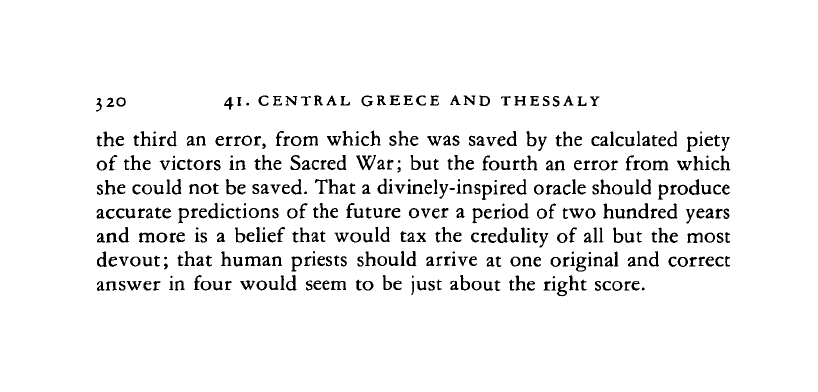
32O 4
1
- CENTRAL GREECE AND THESSALY
the third an error, from which she was saved by the calculated piety
of the victors in the Sacred War; but the fourth an error from which
she could not be saved. That a divinely-inspired oracle should produce
accurate predictions of the future over a period of two hundred years
and more is a belief that would tax the credulity of all but the most
devout; that human priests should arrive at one original and correct
answer in four would seem to be just about the right score.
Cambridge Histories Online © Cambridge University Press, 2008
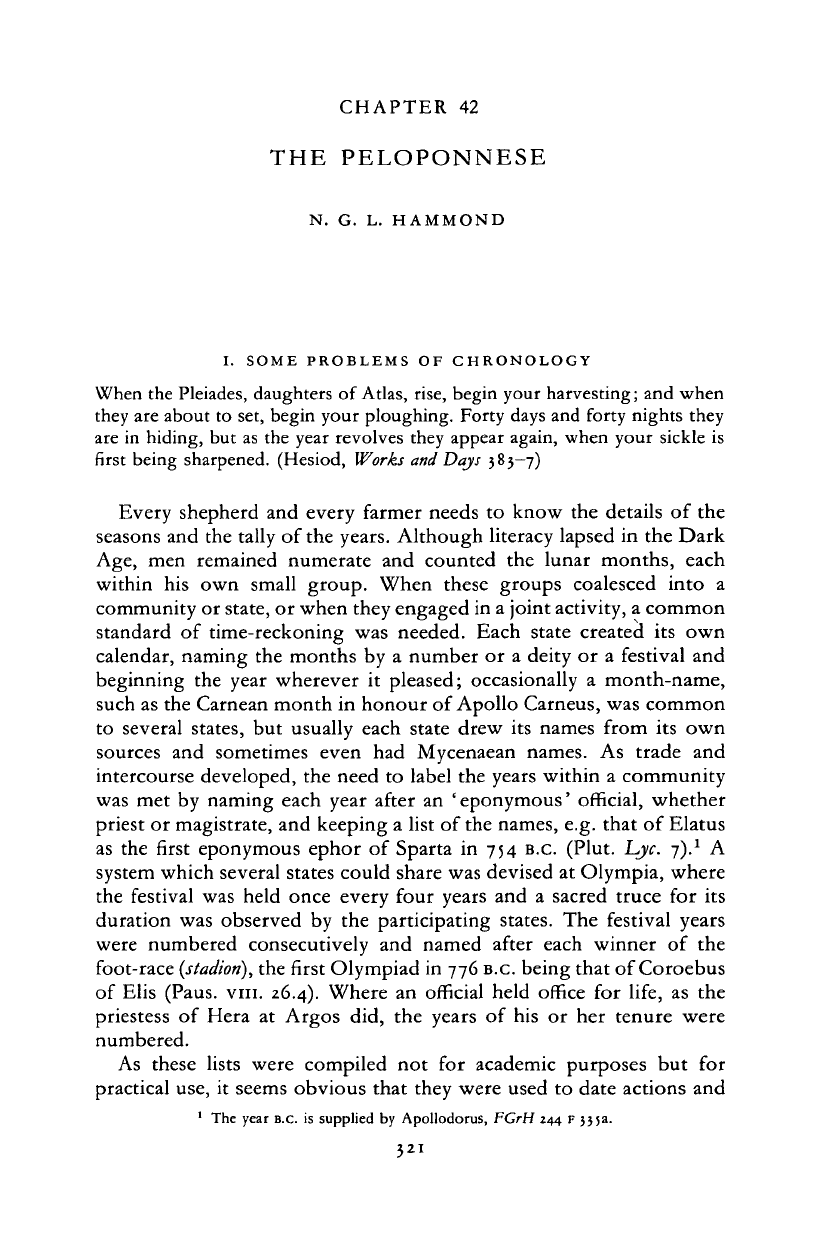
CHAPTER
42
THE PELOPONNESE
N. G. L.
HAMMOND
I. SOME PROBLEMS OF CHRONOLOGY
When the Pleiades, daughters of
Atlas,
rise, begin your harvesting; and when
they are about to set, begin your ploughing. Forty days and forty nights they
are in hiding, but as the year revolves they appear again, when your sickle is
first being sharpened. (Hesiod,
Works and Days
383—7)
Every shepherd and every farmer needs
to
know the details
of
the
seasons and the tally of the years. Although literacy lapsed in the Dark
Age,
men
remained numerate
and
counted
the
lunar months, each
within
his own
small group. When these groups coalesced into
a
community or state, or when they engaged in a joint activity, a common
standard
of
time-reckoning was needed. Each state created
its own
calendar, naming the months by
a
number
or a
deity
or a
festival and
beginning
the
year wherever
it
pleased; occasionally
a
month-name,
such as the Carnean month in honour of Apollo Carneus, was common
to several states, but usually each state drew
its
names from
its
own
sources
and
sometimes even
had
Mycenaean names.
As
trade
and
intercourse developed, the need to label the years within
a
community
was met by naming each year after
an
'eponymous' official, whether
priest or magistrate, and keeping a list of the names, e.g. that of Elatus
as the first eponymous ephor
of
Sparta
in
754
B.C.
(Plut. Lye. 7).
1
A
system which several states could share was devised at Olympia, where
the festival was held once every four years and
a
sacred truce
for its
duration was observed
by
the participating states. The festival years
were numbered consecutively
and
named after each winner
of the
foot-race
{stadiori),
the first Olympiad in 776
B.C.
being that of Coroebus
of Elis (Paus. vm. 26.4). Where
an
official held office
for
life,
as the
priestess
of
Hera
at
Argos did,
the
years
of
his
or her
tenure were
numbered.
As these lists were compiled
not for
academic purposes
but for
practical use,
it
seems obvious that they were used to date actions and
1
The year B.C.
is
supplied
by
Apollodorus, FGrH 244 F 335a.
5
21
Cambridge Histories Online © Cambridge University Press, 2008
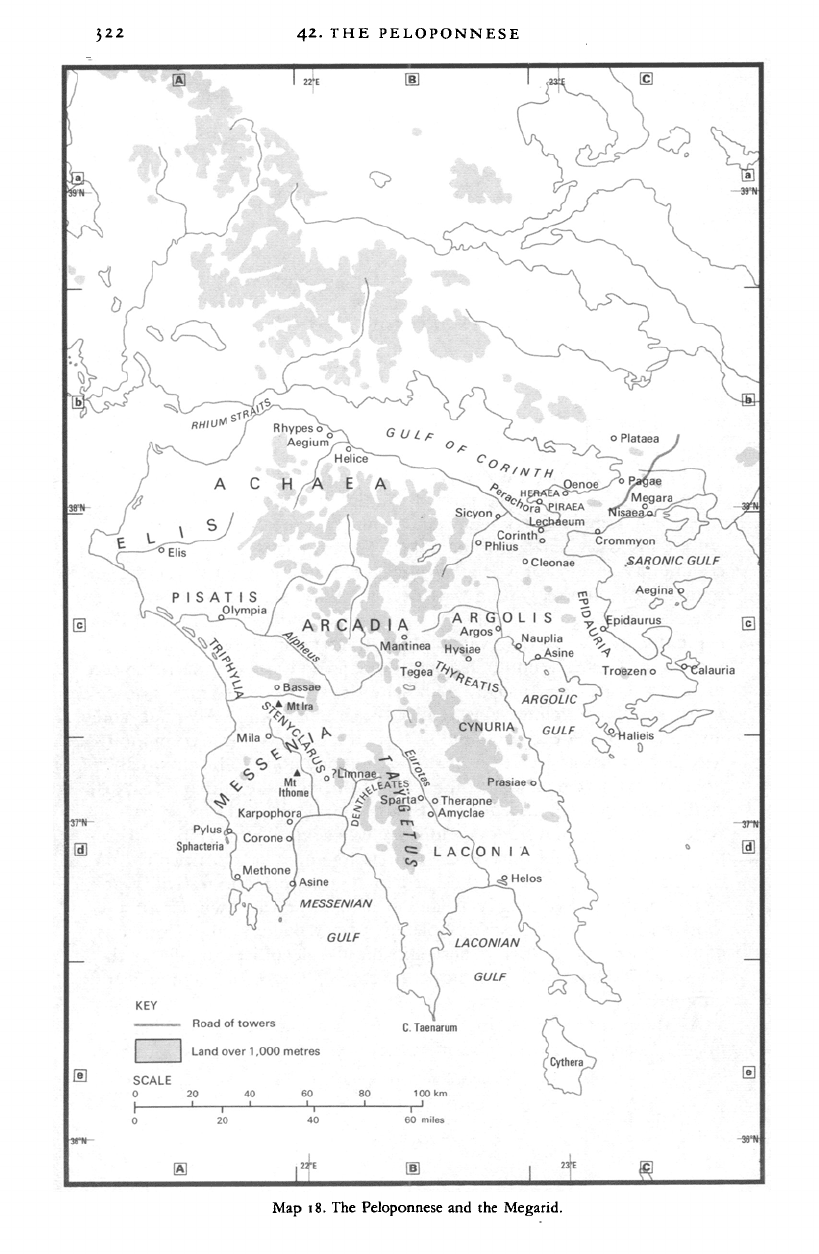
322
42.
THE PELOPONNESE
19
<Q
HI @
Hl
KEY
\ Karpophor
i o.
. %) Coroneol
Sphactena J I
LMethone
aJi_(5
Asine
MESSENIAN
GULF
Sparta<>
m
—\
c=
Co
\
\
x
}
C.Ta
\oTherapne
dyAmyclae
L A C?0
N
1
\ LACONIAN
K GULF
I
enarum
Land over
1,000
metres
I
Map 18. The Peloponnese and the Megarid.
Cambridge Histories Online © Cambridge University Press, 2008
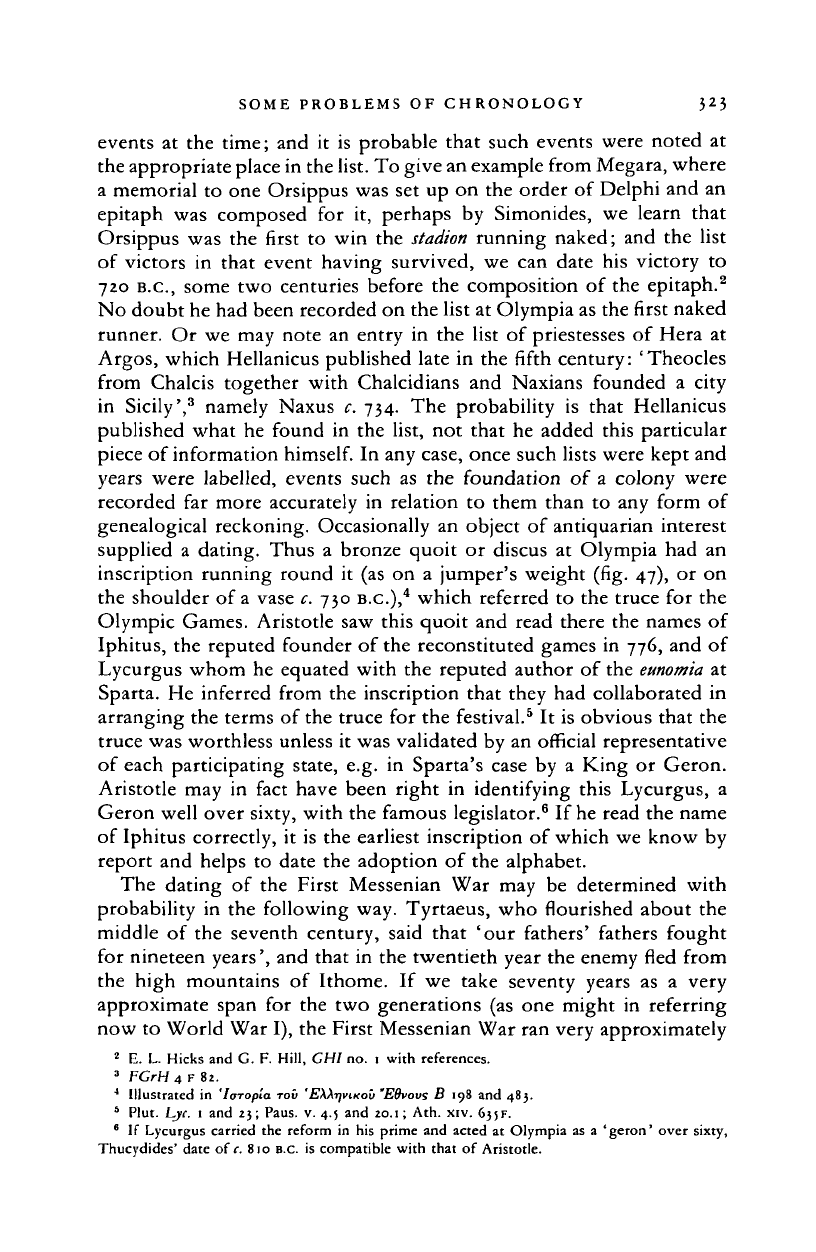
SOME PROBLEMS OF CHRONOLOGY 323
events
at
the time; and
it is
probable that such events were noted
at
the appropriate place in the list. To give an example from Megara, where
a memorial
to
one Orsippus was set up on the order
of
Delphi and an
epitaph
was
composed
for it,
perhaps
by
Simonides,
we
learn that
Orsippus was
the
first
to
win the station running naked; and the list
of victors
in
that event having survived,
we can
date
his
victory
to
720 B.C., some two centuries before the composition
of
the epitaph.
2
No doubt he had been recorded on the list at Olympia as the first naked
runner.
Or
we may note
an
entry
in the
list
of
priestesses
of
Hera
at
Argos, which Hellanicus published late
in
the fifth century: 'Theocles
from Chalcis together with Chalcidians
and
Naxians founded
a
city
in Sicily',
3
namely Naxus c. 734.
The
probability
is
that Hellanicus
published what
he
found
in
the list,
not
that
he
added this particular
piece of information
himself.
In any case, once such lists were kept and
years were labelled, events such
as the
foundation
of a
colony were
recorded
far
more accurately
in
relation
to
them than
to
any form
of
genealogical reckoning. Occasionally
an
object
of
antiquarian interest
supplied
a
dating. Thus
a
bronze quoit
or
discus
at
Olympia had
an
inscription running round
it
(as
on a
jumper's weight (fig. 47),
or on
the shoulder of a vase
c.
730 B.C.),
4
which referred
to
the truce
for
the
Olympic Games. Aristotle saw this quoit and read there the names
of
Iphitus, the reputed founder
of
the reconstituted games
in
776, and of
Lycurgus whom he equated with the reputed author
of
the
eunomia
at
Sparta. He inferred from the inscription that they had collaborated
in
arranging the terms of the truce for the festival.
5
It
is obvious that the
truce was worthless unless
it
was validated by an official representative
of each participating state, e.g.
in
Sparta's case
by a
King
or
Geron.
Aristotle may
in
fact have been right
in
identifying this Lycurgus,
a
Geron well over sixty, with the famous legislator.
6
If
he read the name
of Iphitus correctly,
it
is the earliest inscription
of
which we know by
report and helps
to
date the adoption
of
the alphabet.
The dating
of
the First Messenian
War
may
be
determined with
probability
in
the following way. Tyrtaeus, who flourished about the
middle
of
the seventh century, said that
'our
fathers' fathers fought
for nineteen years', and that in the twentieth year the enemy fled from
the high mountains
of
Ithome.
If we
take seventy years
as a
very
approximate span
for
the two generations (as one might
in
referring
now to World War I), the First Messenian War ran very approximately
2
E. L.
Hicks and
G.
F. Hill, CHI no. 1 with references.
3
FGrH 4 F 82.
4
Illustrated
in
'Iaropia
TOU
'EXXT]VIKOV
"Edvovs
B
198 and 483.
s
Plut. Lye. 1
and
23; Paus.
v.
4.5
and
20.1; Ath. xiv. 63;F.
6
If
Lycurgus carried
the
reform
in
his prime and acted
at
Olympia
as a
'geron' over sixty,
Thucydides' date
of c
810 B.C.
is
compatible with that
of
Aristotle.
Cambridge Histories Online © Cambridge University Press, 2008
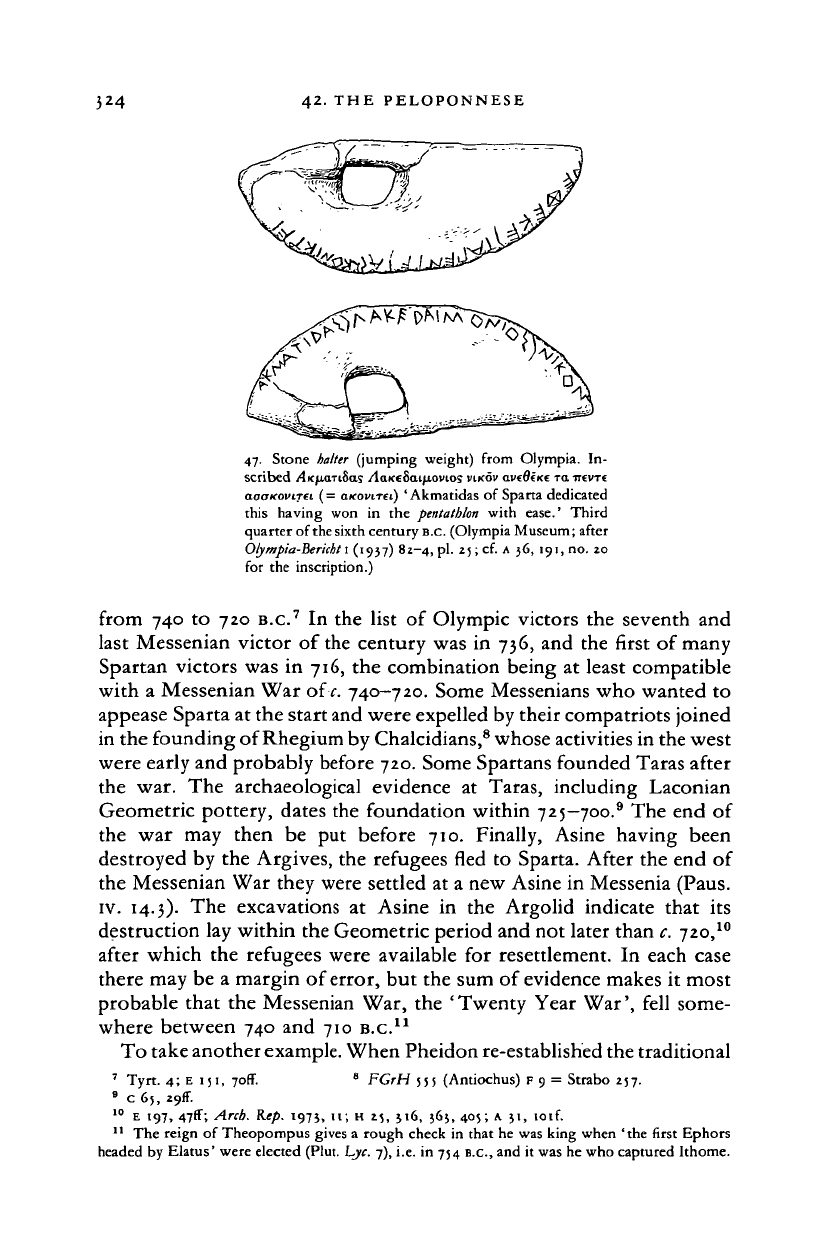
3
2
4
42-
THE
PELOPONNESE
47.
Stone
halter
(jumping weight) from Olympia.
In-
scribed ^4/c/xaTiSa?
AaKeSaifiovtos
VIKOV
a»£0e/c£
ra
TTtvre
aooKovLjei
(=
atcovirei)
'Akmatidas
of
Sparta dedicated
this having
won in the
pentathlon
with ease.' Third
quarter of the sixth century
B.C.
(Olympia Museum; after
O/ympra-Bericbti(iy$j)
82—4,
pi.
2j;cf.
A
36,
191,
no.
20
for
the
inscription.)
from
740 to 720
B.C.
7
In the
list
of
Olympic victors
the
seventh
and
last Messenian victor
of
the century
was in
736,
and the
first
of
many
Spartan victors
was in 716, the
combination being
at
least compatible
with
a
Messenian
War ofr.
740-720. Some Messenians
who
wanted
to
appease Sparta
at
the start and were expelled by their compatriots joined
in
the
founding of Rhegium by Chalcidians,
8
whose activities
in
the west
were early
and
probably before 720. Some Spartans founded Taras after
the
war. The
archaeological evidence
at
Taras, including Laconian
Geometric pottery, dates
the
foundation within 725-700.
9
The end of
the
war may
then
be put
before
710.
Finally, Asine having been
destroyed
by the
Argives,
the
refugees fled
to
Sparta. After
the end of
the Messenian
War
they were settled
at a new
Asine
in
Messenia (Paus.
iv. 14.3).
The
excavations
at
Asine
in the
Argolid indicate that
its
destruction
lay
within
the
Geometric period
and not
later than
c.
720,
10
after which
the
refugees were available
for
resettlement.
In
each case
there
may be a
margin
of
error,
but the sum of
evidence makes
it
most
probable that
the
Messenian
War, the
' Twenty Year
War',
fell some-
where between
740 and 710
B.C.
11
To take another
example.
When Pheidon re-established the traditional
7
Tyrt.
4;
E
1
JI,
7off.
8
FGrH 555 (Antiochus)
F 9 =
Strabo
257.
9
c 65, 2
9
ff.
10
E 197, 47ff;
Arch.
Rep.
1973,
n; H 25, 316,
363, 405;
A
31, loif.
11
The
reign
of
Theopompus gives
a
rough check
in
that
he was
king when
'the
first Ephors
headed
by
Elatus' were elected (Plut. Vyc. 7),
i.e. in 754
B.C.,
and it
was
he who
captured Ithome.
Cambridge Histories Online © Cambridge University Press, 2008
